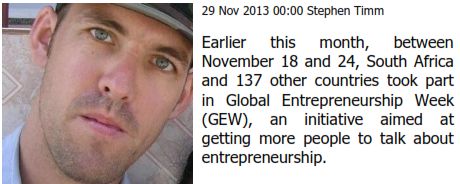CHAPTER 13
South Africa’s poor performance in entrepreneurship events

The initiative was started by US think-tank the Kaufmann Foundation in 2008 and last year more than 7.4-million people across the world took part in more than 19 600 workshops, competitions, seminars and exhibitions run by 7 609 organizations.
However, South Africa continues to have one of the most poorly attended GEWs in the world.
Although the number of participants in GEW events in the country peaked at 11 620 in 2011, last year 2 309 people attended 16 events and workshops hosted by 29 organizations.
This is far behind the 1.6-million participants that Brazil attracted last year, or even the 199 000 by the small island state of Barbados.
This year in South Africa, only a handful of organizations hosted events during the week, going on the number of events publicized on the official GEW website Unleashingideas.org. Notably missing were the names of large companies and that of the government’s small business organisation, the Small Enterprise Development Agency (Seda), whose staff had only taken part in events hosted by other institutions, Seda spokesman Marius de Villiers said.
In some cases a number of other organizations ran events during GEW that were not included on the GEW site or branded with the event’s logo — and in so doing minimized the impact the event could have had.
A campaign of this magnitude is necessary because far too few South Africans see being an entrepreneur as a viable career option.
Only 14% of Africans intend to start a business in the next three years, according to the 2012 Global Entrepreneurship Monitor (Gem) report — compared to 43% of Chileans, 36% of Brazilians, 20% of Chinese and 19% of Thais.
Media support
GEW is hosted locally by Endeavor South Africa, the sister organization of Endeavor Brazil, which hosts the event in Brazil.
Managing director of Endeavor South Africa Catherine Townshend admitted that the event did not have the impact it could have had in South Africa, but she said the organisation was limited by its small budget, which is drawn from donations from its board members and a small fee that its member companies pay.
Townshend said support from corporates and the media is also not that forthcoming.
A number of years ago Endeavor South Africa’s former managing director, Malik Fal, complained that media groups did not want to devote space in their publications to cover entrepreneurship that week.
Fal said this month that Endeavor Brazil had been assisted by newspapers, which offered free space in their publications and television channels that offered free time, while designers and an advertising agency had pitched in free of charge.
In contrast, the media in South Africa gives the week little attention, he said.
Endeavor Brazil has already won four awards from the Kaufmann Foundation, including those for the best host country and those for the highest number of participants.
Since its launch in Brazil in 2008, the number of participants has catapulted from 466 000 to more than 1.6-million last year as well as from 168 to 553 partner organizations.
Last year in Brazil newspapers, websites and magazines carried 10.8-million reals (R48.4-million) worth of media coverage in Brazil during the week, according to Endeavor Brazil’s 2012 GEW impact report.
The report revealed that 80% of participants in Brazil were inspired to become an entrepreneur after attending events or workshops during the week, while about a fifth said they would start a new business.




